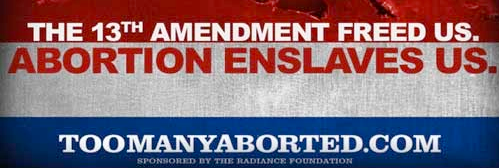
“When you look at what abortion has brought to the Black community, it can’t be typified to anything other than present-day slavery,” said Ryan Scott Bomberger, Chief Creative Officer of The Radiance Foundation, a non-profit, self-described educational life-affirming organization. “It’s just like slavery, because you have a class of people who are considered less than human, and therefore they can be treated like property.”
Huh?
Hillary Shelton, Director of the Washington Bureau of the NAACP, was just as confused as I was. “Women are not forced to have abortions the way they were in servitude,” she told The Huffington Post. “Slavery was about not having the right to make any decisions. Women were actually bred to produce children for the purposes of profit. This is so far removed from that, that if it weren’t such a serious issue, it would almost be laughable.”
No matter where you stand on abortion (pro-life vs. pro-choice), it is no laughing matter, especially when Black women account for about 30 percent of all U.S. abortions, but only 12 percent of the population.
Of course, there is a cause for concern, but attempting to curb abortion with billboards bringing awareness to the issue is pointless. Whether the ads equate abortion with slavery, feature a picture of President Obama’s face next to the message, “Every 21 minutes, our next future leader is aborted” (Chicago) or show an innocent Black child under the headline, “The most dangerous place for an African American is in the womb” (New York City), they don’t actually address, or attempt to solve the issues.
It’s not like Black women are having abortions at an alarming rate just because of some immoral pathology plaguing the melanin-infused. There are societal factors at play, largely poverty (according to the most recent census data, 42 percent of women who seek abortions are poor) and lack of access to birth control. You want to curb abortion? It’s real clear what’s needed: enabling women to provide financially for their offspring and helping them find regular access to affordable birth control.
Of course, this requires more effort and resources than printing up an inflammatory sign, hanging it up, and offending everyone. But if groups like the Radiance Foundation are really serious about making a dent in the abortion rate, they need to commit to real and effective change, not just flashy signs that create buzz and insight a media circus.
What do you think about comparing abortion to slavery in 2011?
Demetria L. Lucas is the Relationships Editor at Essence Magazine and the author of “A Belle in Brooklyn: Your Go-to Girl for Advice on Living Your Best Single Life” (Atria) In stores now. Follow her on Twitter: @abelleinbk